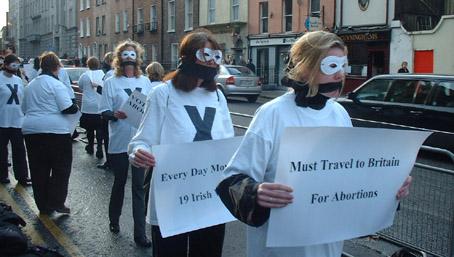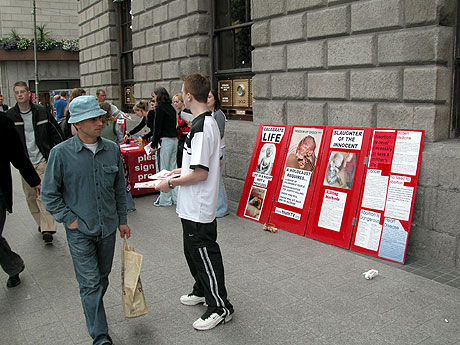European Court Of Human Rights Turns To Restrictive Irish Abortion Law
 national |
rights, freedoms and repression |
feature
national |
rights, freedoms and repression |
feature  Wednesday September 07, 2005 00:59
Wednesday September 07, 2005 00:59 by Niav/One of IMC - Indymedia Ireland
by Niav/One of IMC - Indymedia Ireland

The European Court of Human Rights today held preliminary hearings on the case of an Irish woman claiming her human rights were violated when she was forced to travel to Britain for an abortion.
Taken from an analysis on D by a member of the Alliance For Choice"The woman who has not been identified but is being called 'D' became pregnant with twins. One of these died in the womb and second was found to suffer abnormalities. D decided to have an abortion, but since Irish women are not entitled to have an abortion unless there is a serious threat to their lives, she was forced to travel to Britain. D claims that her inability to obtain an abortion in the Republic of Ireland was a breach of her human rights. The complaint is being made under two articles of the human rights convention: Article 3, that nobody be subjected to torture, in humane or degrading treatment or punishment, and Article 8, the right to respect for private and family life and of no interference by a public authority with the exercise of this right.
The case could potentially result in Ireland's constitutional ban on abortion being challenged by a panel of European judges. If the court were to find in favour of D in this case, it could mean the Irish government would be forced to extend the right to abortion to women whose foetuses were found to be abnormal. The case has been brought directly to Strasbourg court, and has never been before the Irish courts, the usual approach before going to Europe. It could take a year or more for a hearing and there is a possibility the case might not be found admissible."
Some coverage on the topic from the good folk on IMC Ireland:
Back street abortions illustrate need for free, safe and legal abortion services in Ireland | Alliance For Choice condemns Bush's 'War on Women'! | Restrictive Abortion Information Legislation Jeopardises Women's Health | Day Of Action Against The Information Act | Pro Life Campaign considering legal action against Midland Health Board | Interview on the legacy of the X-case | Do You Remeber the Last Time? The Abortion Referendum of 2002 | Yes, It was No..
 Where The Parties Stand: Where The Parties Stand:(taken from the analysis of the D case) Fianna Fáil: Fine Gael: Has no plans to seek a change in the legal situation. Fine Gael, which along with Labour campaigned for a No vote in the last referendum, said yesterday it had no plans to seek a change in the legal position in relation to abortion. This was despite a pledge by former party leader Michael Noonan in 2002 that Fine Gael in government "would legislate to reflect in statute law" the X case decision. Labour: Supports the introduction of legislation allowing for abortion if there is a life-risk to the woman, a foetal abnormality that means the foetus will never be born alive, or a risk of "significant injury" to the physical health of the mother. PDs: A party spokeswoman said it was "against abortion" but had a specific policy document on the matter. She added: "We don't impose a whip on party members, as it is a matter of conscience." Sinn Féin: Supports the introduction of legislation allowing for abortion where a woman's life and mental health is at risk, or in cases of rape and sexual abuse. Greens: |
|
It follows from the launch of a major new campaign by the Irish Family Planning Association for the introduction of legal abortion services in Ireland. Announcing details of the campaign in early August, the IFPA's Chairperson, Catherine Forde said 'this campaign is of unique significance, as it represents the first major initative aimed at moving forward on abortion in this country. Previous campaigns on abortion have always been lead by anti-choice groups seeking further regressive and unworkable responses to abortion." 6217 women who gave addresses in Ireland had an abortion in Britain last year, according to recently released British abortion statistics. This means that at least 17 Irish women go to Britain for an abortion every day. 'This figure doesn't include the increasing number of women who go to the Netherlands, Belgium and France, because of cheaper flights and the lower cost of a termination' said Sian Muldowney, spokesperson for the pro-choice Alliance for Choice in a press release on this site. Reprint of The Press Release from IFPA detailing launch of campaign for "safe and legal" abortion services in Ireland:
|